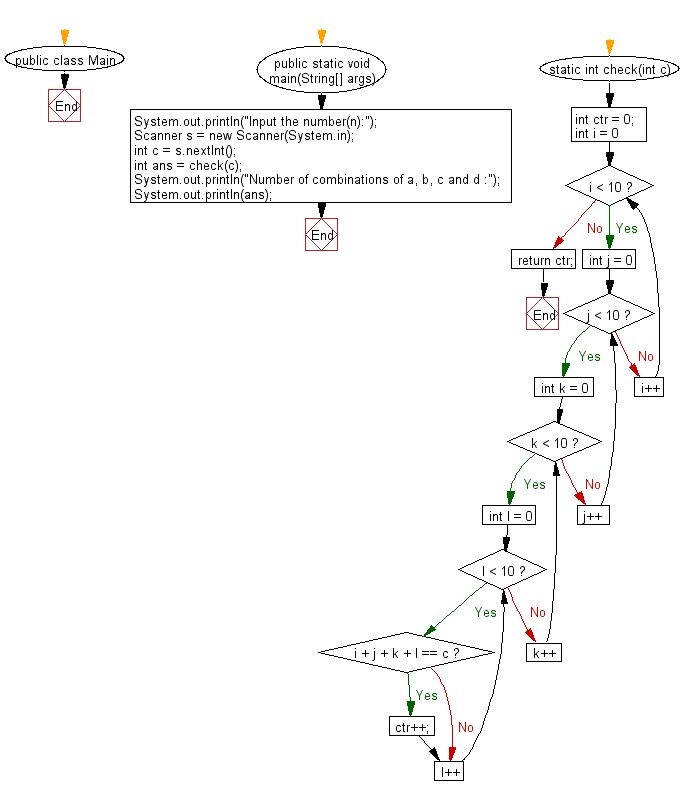Java: Reads an integer n and find the number of combinations of a,b,c and d will be equal to n
Count Combinations for Sum N
Write a Java program which reads an integer n and finds the number of combinations of a,b,c and d (0 ≤ a,b,c,d ≤ 9) where (a + b + c + d) equals n.
Input:
n (1 ≤ n ≤ 50).
Sample Solution:
Java Code:
import java.util.Scanner;
public class Main {
public static void main(String[] args) {
// Prompting the user to input the number (n)
System.out.println("Input the number(n):");
// Creating a Scanner object for user input
Scanner s = new Scanner(System.in);
// Reading the input number (n) from the user
int c = s.nextInt();
// Calling the check method to find the number of combinations
int ans = check(c);
// Displaying the number of combinations of a, b, c, and d
System.out.println("Number of combinations of a, b, c, and d :");
System.out.println(ans);
}
// Method to check the number of combinations
static int check(int c) {
// Initializing a counter for combinations
int ctr = 0;
// Nested loops to iterate through all possible combinations of a, b, c, and d
for (int i = 0; i < 10; i++) {
for (int j = 0; j < 10; j++) {
for (int k = 0; k < 10; k++) {
for (int l = 0; l < 10; l++) {
// Checking if the sum of a, b, c, and d equals the input number (n)
if (i + j + k + l == c) {
// Incrementing the counter for valid combinations
ctr++;
}
}
}
}
}
// Returning the total number of combinations
return ctr;
}
}
Sample Output:
Input the number(n): 5 Number of combinations of a, b, c and d : 56
Flowchart:

For more Practice: Solve these Related Problems:
- Write a Java program to count the number of combinations of four digits (0–9) that sum to a given target using recursion.
- Write a Java program to determine the number of combinations of five digits that sum to a specified value under given constraints.
- Write a Java program to compute the number of combinations where the sum of selected digits equals n using dynamic programming.
- Write a Java program to count the number of distinct combinations of digits (order irrelevant) that yield a specific sum.
Go to:
PREV : Compute Loan Debt After N Months.
NEXT : Count Prime Numbers ≤ N.
Java Code Editor:
Contribute your code and comments through Disqus.
What is the difficulty level of this exercise?
Test your Programming skills with w3resource's quiz.
